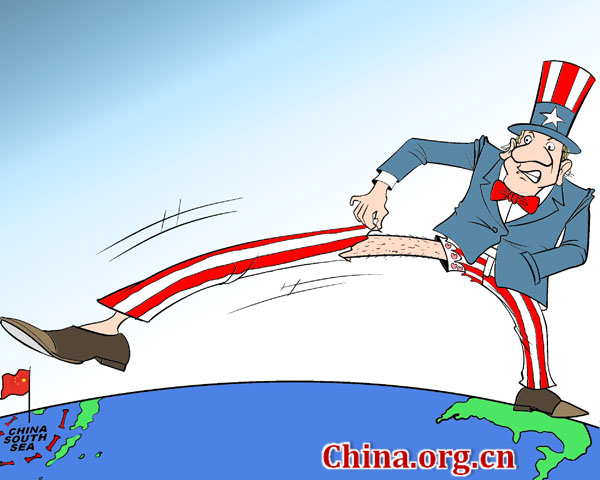US hypocrisy on South China Sea island reclamation
- By Xu Qinduo
 0 Comment(s)
0 Comment(s) Print
Print E-mail CRI, May 29, 2015
E-mail CRI, May 29, 2015
|
|
|
The long-distance meddler [By Jiao Haiyang/China.org.cn] |
The United States is considering sending warships and helicopters to patrol in the South China Sea, under the guise of so-called "freedom of navigation" exercises. This is reportedly part of a plan to pressure China into scaling back its construction work in the Spratly islands (known in China as the Nansha islands).
That would be an unjustifiable and provocative act, which could lead to a military confrontation between the world's two most powerful countries.
The US has so far failed to build a strong case for its much-talked-about strategic move. On May 13, US Assistant Secretary of State Daniel Russel said in testimony before the Senate Foreign Relations Committee that the US:
"can and does play an active role in the South China Sea to defend our national interests and international legal principles."
Defending national interests is certainly true - but defending "international legal principles"? That seems a hollow claim, since Washington is not even a member of the United Nations Convention on the Law of the Sea, which it refers to frequently when it comes to the South China Sea disputes.
So how does the US justify potentially using its military to try to contain the "China threat"? And do those justifications stand up to scrutiny?
One rule for most nations, another for China
There has been much media coverage and hype (including in The Conversation) about how quickly China is creating a sizeable landmass in the disputed South China Sea islands.
But nearly all of those articles have failed to explain one critical point: what is the proper size of reclamation that is acceptable and not alarming?
And why is there one rule for China and another for other nations?
Speaking at the same Senate hearing on May 13, US Assistant Secretary of Defence David Shear explained that:
"Over the past two decades, all of the territorial claimants, other than Brunei, have developed outposts in the South China Sea, which they use to project civilian or maritime presence into surrounding waters, assert their sovereignty claims to land features, and monitor the activities of other claimants. In the Spratly islands, Vietnam has 48 outposts; the Philippines eight; China eight; Malaysia five; and Taiwan one."
So, despite being the largest and most powerful country among the claimants, China has, for many years, exercised a high degree of self-restraint.
And as Shear also said, compared with Vietnam and the Philippines, China is a latecomer:
"Between 2009 and 2014, Vietnam was the most active claimant in terms of both outpost upgrades and land reclamation, reclaiming approximately 60 acres."
But have you ever read or heard of US criticism of Hanoi, or a US threat to send warships to deter the Vietnamese activity in the South China Sea?







Go to Forum >>0 Comment(s)